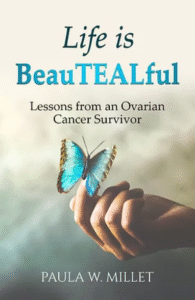
This is a topic that’s been heavy on my heart for about a week now, intensified by the introspective wisdom found within the pages of my current read, Life is BeauTEALful: Lessons From an Ovarian Cancer Survivor, by Paula W. Millet. My normal path would be to take these difficult emotions and force them down into that festering pit deep within my stomach, where it will eventually transmute into some type of bleeding ulcer. However, Ms. Millet has suggested I write, and when a respectable author of 8 amazing books (and counting) tells you to write, you take it to heart. So I’m going to risk the vulnerability and give it a go.
What weighs down my heart is one of the simplest words that also has the most complex meanings, which is largely different for everyone who experiences it: GRIEF.
I grew up very aware of Elizabeth Kubler-Ross and her model for the Five Stages of Grief:
- Denial
- Anger
- Bargaining
- Depression
- Acceptance
She never claimed this was a linear process to be followed from one to the other. Instead, she admitted to the fluidity of the process, an individualized flow that often sees a person skip from one to the other, then backtrack to revisit prior stages, only to possibly skip ahead a few. But in the end, she says, you reach acceptance. Once there, you’ve completed the grieving process. Congratulations, it’s done. And since I couldn’t imagine there could possibly be anything to do after finally accepting a loss, I believed this to be true.
Until last week.
What the Kubler-Ross model fails to acknowledge is how the completion of the grieving process can leave you, most ironically…grieving. You grieve for the grieving process.
But bear with me, because you know I’m on the verge of offering you an excessively lengthy explanation, packed with unnecessary attention to detail and largely irrelevant tangents.
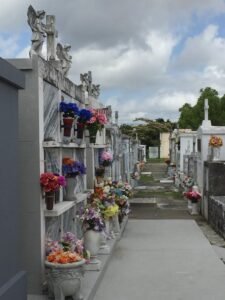
When my mom died, I found peace in the cemetery. There was always something innately special about New Orleans-area cemeteries, where it seems architecture is equally as important as the perpetual care it provides. I’ve always said cemeteries are for the living; the dead don’t care where their vacant bodies lie. But those of us who live want a beautiful place to go to, so we can associate the death of our loved one with peace and contentment.
This is exactly what I found at Our Lady of Prompt Succor, a historic 1896 cemetery in Westwego, Lousiana, blocks from where my mom grew up. I was already familiar with the cemetery, as my grandma and many great aunts and uncles had already taken their permanent places within the above-ground tombs and walls of the mausoleum. As a child, I used to like walking up and down the aisles, challenging myself to find the oldest tomb within the gates, and making a point to flip open the metal plates that held a photo of the individual within, in the image their family wanted to remember them forever.
When Mom took her eternal place in the back corner of the mausoleum, with her parents and brother, the entire atmosphere had such a peaceful vibe. The church bells would inevitably ring during my visits, a beautiful chorus of variably pitched chimes echoing in the air from the very church my parents wed. I’ve always been fascinated with church bells–and stained glass–and Our Lady of Prompt Succor had the best of both. It was, for all intents and purposes, a place I could better connect with God and my faith, and where I could feel closer to my mom again. One could–and often did–argue, “You don’t need to go to a cemetery! She’s not even there! She’s with you wherever you go!” But despite the cliches thrown at me, I’ve always felt her presence was stronger there. It was hallowed ground, and the whole environment was simply different than anywhere else I’ve been. I wouldn’t call it my “happy place”, but it was certainly my place of peace.
Over the last several years, my aunt and I developed a routine. She would pay her respects, then walk away to wander the grounds or wait in the car, allowing me privacy. I’d always sit in reverent silence, leaning against the name plate that separated me from my mom, a tangible barrier between life and death. I’d close my eyes, trying to sense her, to feel her presence. I believed if I stayed still long enough, I may even get to hear her voice, or receive a sign that she was near. And, after time had passed, and I felt content with my visit, I’d stand up, brush myself off, and return to wherever my aunt was waiting, to continue my vacation and visits with the living part of my extended family.
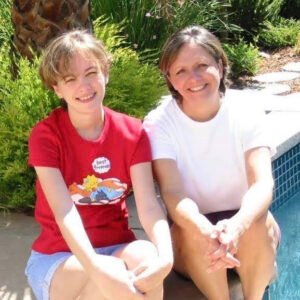
But something happened during my last visit, which I found myself unable to explain at the time.
A surgery with complications, followed by a pandemic, kept me away from New Orleans for three years. When I finally returned this past January, I was eager to get to the cemetery. My life was wildly different than it was the last time I had gone, and I proudly boasted to my friends how excited I was to finally be able to stand before my mom’s grave as a “somebody”. I was no longer the lost person I had been for so long, merely floating through life with no direction. I had regained, for the most part, control of my mind. I had created a business. I found my purpose. My headspace was better than it had been in more than a decade, and I was doing something great with my life I knew would have made Mom proud. How thrilled I was, to be able to stand there as a completely different, BETTER person than I had ever been prior.
But as I stood before that name plate of the mausoleum wall, something unexpected happened: I began to cry. And it wasn’t just a tear here or there; within seconds, I was sobbing in the same manner I had when I realized she was never coming home to me. I was inconsolable, struggling to catch my breath, but giving up on trying to wipe the tears. They were coming too fast, in too great a quantity, for me to do anything but let them fall freely. The whole time I bawled, I was asking myself WHY. What was wrong with me? I have NEVER had this reaction in the cemetery before! This had always been my place of peace. I had been so excited to be able to stand tall and proudly for the first time–what went wrong? I didn’t understand any of it. I had only barely calmed myself down, when I knew I had to leave. I simply couldn’t handle it, so I quickly scurried to the front gate, where my aunt was waiting for me. As soon as I climbed into the front seat, I wiped my face with my sleeve and told her, “I can’t come back here anymore. I can’t. Look what it’s done to me! I can’t come back here, if my peace is gone. I can’t come back.” The one place I had found my greatest peace and deepest spiritual connection was no longer healthy for me, and I couldn’t comprehend the reason.
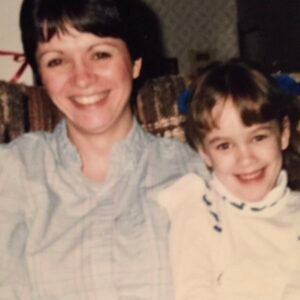
We drove away in silence, and I immediately decided not to speak about the incident. It was too upsetting, so as far as my friends back home knew, it was routine as always. But it was anything other than that. Even though I was in my best place, mentally and physically, than I had been in over 10 years, I had somehow broken in a most unexpected manner. And I didn’t know why.
And like I’m prone to do, I dealt with it by allowing it to join my other woes in the pit of my stomach I referenced at the beginning of this lengthy dissertation, and I simply didn’t speak of it, to anyone. It just nourished the ulcer.
Then last week, I ventured to Flowery Branch, so Susie and Laura could help me with my pretzel dipping project. Susie decided the motto when the three of us get together is, “That Didn’t Go As Expected”. It’s wild how many things go wrong, when we’re together, especially if we’re working on something specific with a deadline, but we always still have fun. On the night in question, though, Laura had returned to her own house for the night, while I was playing catch-up in the pretzel dipping war, battling unforgiving chocolate that had seized. Because Susie was leaving for Michigan the following morning, the conversation started in regards to interstate travel, then drifted to the travel chaos of my mom’s funeral, and then to the family I enjoy visiting. We were specifically discussing a particular cousin who lives just blocks from the cemetery, which prompted me to make the very abrupt comment, “But I can’t go back to the cemetery. I can never go back.” Having never given anyone a reason to think anything had gone wrong, Susie was caught by surprise, and I found myself tearing up again, explaining to her what had occurred.
Again, I repeated, “But I don’t know what happened. What went wrong?”
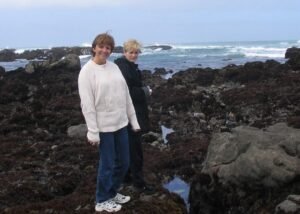
One thing you must know about Susie: if she had the ability to leave her job in the office, rather than carry it home each night in her heart, she would have made a positively brilliant psychologist. And in that moment, with no real direction or train of thought, she simply spoke, trying to come up with a theory on why I would spontaneously react so dramatically, so negatively, in a place that had always brought me only peace.
“I don’t know what I’m trying to say,” she paused, trying to collect her thoughts. But somehow, even though she didn’t know where her mind was going, I suddenly did. And together, we started picking it apart, building off of one another’s words, and we reached the same conclusion at the same time:
I’m in the best mental and physical health since years prior to Mom’s death.
One could even say I’m thriving.
But I’m thriving without her. For the first time, I’m no longer stuck in limbo, and I’m doing great things no one would have ever imagined I could accomplish…not even myself. And this presents a problem I was wholly unaware I even had:
“I don’t need my mom,” I whispered painfully to Susie, and the dam that had held my tears at bay suddenly broke, confirming we had hit on something. “The fact I’m crying this much just saying the words must mean it’s true.”
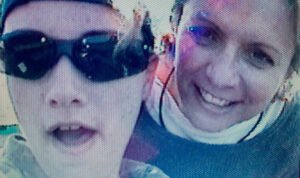
That night, at the table dipping pretzels, I discovered for the first time I cried at the cemetery, because I realized, on a subconscious level, I do not need my mom anymore. And I WANT to need her. I need to need her. Mom raised me to be dependent on her, because she needed to be needed. And in some horrid act of betrayal, I now had this brand new life she wasn’t a part of, and I was thriving…without her. I had put so much emphasis on returning to the cemetery as a different, better person, I had inadvertently set myself up to discover a harsh reality.
I no longer need my mom.
And while that’s a huge step in the right direction in life and healing, the final step of the Kubler-Ross model, it came with no fanfare. Instead, I realized I was grieving the grieving process. I was upset, because I had moved on. In that instance, everything made sense. It all clicked.
It’s such a conflicting mindset: you want to heal and move forward with your life, but you also don’t want to let that part of yourself go. And standing in the cemetery that day, my heart apparently realized what my mind would take another 6 months to figure out: yes, I was finally standing before her grave as a “someone”. But that “someone” I had become was a person she would never meet, because I no longer needed her, in order to accomplish good things. It’s a concept both celebratory and soul-crushing.
As my tears began to slow, I took a deep breath and wiped my face with a towel. I looked into Susie’s eyes, totally and completely exhausted from the whirlwind of truly intense emotions I just endured, which came almost from nowhere, and whispered those eloquent, pointed words: “holy shit”.
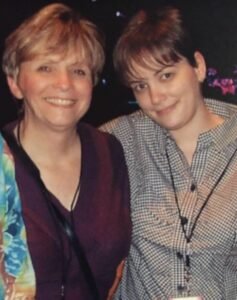
I then looked around at the pretzel dipping project I spontaneously abandoned in favor of one of the most brutal epiphanies of my life and sighed wearily, every ounce of energy sucked out of me.
“That…did not go as expected,” Susie muttered, and we began to laugh again.
It’s been a week since this transpired, and I’m still trying to sort through the repercussions. I’m so proud of myself for having come this far, but at the same time, I’m still grieving for the grieving process. That kind of grief was hard, but it was also familiar and comfortable, in a way. But a life where I don’t need my mom? A life where I can run a business, have a semblance of a social life, make my own medical decisions, and not need her guidance? That’s terrifying. But it’s also where I am now, and that puts me in an entirely new and unexpected model of which Elizabeth Kubler-Ross never warned anyone.
Grief doesn’t end with acceptance. In fact, I’m not sure it ever ends. I’m proof enough of that. I’ve “accepted” my mom is dead. And I’ve learned to give myself a life without her, and a pretty decent one, at that. I’ve “accepted” all of these things, but at the same time, I grieve for the days I did need her. She wrapped up so much of her identity in being needed, and now it feels like we’ve truly broken up and parted ways, in a manner I never saw coming.
I’m so proud of myself, for making it this far. But nothing is ever black and white with me, my emotions very much resembling one huge, complex Venn diagram where they stand both independently and merged at points. I’m both proud and sad. I’m grieving the grief. And that’s where my headspace has been the last week, as it deals with other things, too. Simply put, I’m just trying to sort through my own conflicting emotions, trying to convince myself it’s OK to feel so many things at once. Those emotions can coexist, I’m sure; I just have to figure out how to allow them to do so.
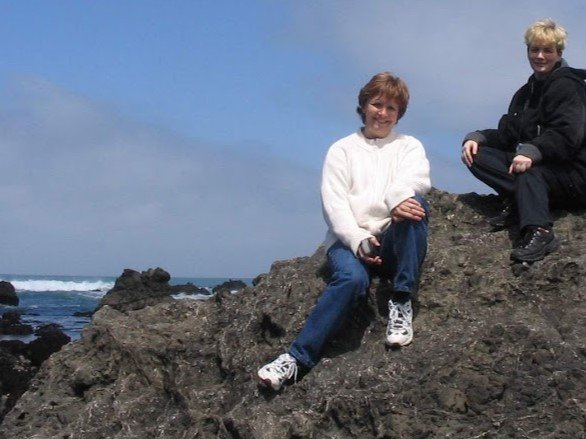
Categories: Uncategorized
I’m sending you a virtual hug! Thanks for allowing my gentle push to motivate you to share your thoughts with a readership that is soon to come. You are a brilliant writer with incredible insight born from experience. And your words will touch the hearts of many. Keep at it… Someday, this will become a book. I promise.
So proud of you. A journey of a thousand miles begins with that first step.